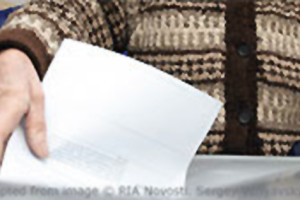Snob: The Mathematics of a Boycott

(Institute of Modern Russia – imrussia.org – January 12, 2018)
Dmitry Oreshkin argues that Navalny’s call for a boycott is good step for him, but not for voters
Even before he was officially denied nomination as a presidential candidate, Alexei Navalny called on his supporters to boycott the presidential elections. Political commentator Dmitry Oreshkin discusses why this is good step for him, but not for voters.
If the boycott occurs, the drop in turnout will be attributed to Navalny, even though this cannot be proved. What’s more, Navalny’s supporters will say that had he been allowed to run, it would have pushed the elections into a second round.
In Russia, there are loosely two large electoral clusters-a notionally competitive cluster and one composed of “electoral sultanates,” whose election results depend strongly on the interests of regional elites. These “sultanates” (republics like Chechnya, which return 90-100 percent of the vote for the Kremlin’s candidates) control about 12-15 million voters, out of the 110 million nationwide.
Oreshkin argues that regardless of Navalny’s call for a boycott, the elections will have a lower turnout than usual. But the main problem with a lower turnout is that it benefits the candidate in power.
For example, in 2011, United Russia won 32.4 million votes in the State Duma elections. In 2016, the number went down to 28.4 million. But since the majority of the competitive cluster opted out of the elections, United Russia scored high.
In the upcoming elections, there are three possible scenarios for voters who decide to boycott or cast a protest vote:
First, if the voter lives in a big city, his or her ballot will not be repurposed-that type of voter fraud is outdated.
Second, enough spoiled ballots could deprive a candidate victory in the first round, at least in the urban centers.
Third, the voter could opt for anyone but the obvious winner, which would hurt the main candidate, possibly preventing him from winning the first round.
Some will not differentiate between the final outcome of the election and a victory that emerges out of the first or second round. But those who ignore the election completely or who are not interested in how many fellow citizens vote, whom they vote for, or how the electoral procedure unfolds, it is time to leave the country, concludes Oreshkin.
Сноб, Математика бойкота, Дмитрий Орешкин, 9 января 2017 г.
Article also appeared at imrussia.org/en/the-rundown/media-must-reads/2894-russia-2042%2C-fight-for-the-ballot%2C-the-kremlin’s-foreign-policy bearing the following notice:
© 2010–2018 The Institute of Modern Russia, Inc.
Citation of material from this website is allowed without obtaining prior permission, provided that it includes a link to the original page.
Link should be placed directly in the body of the text, immediately following or preceding the citation.
